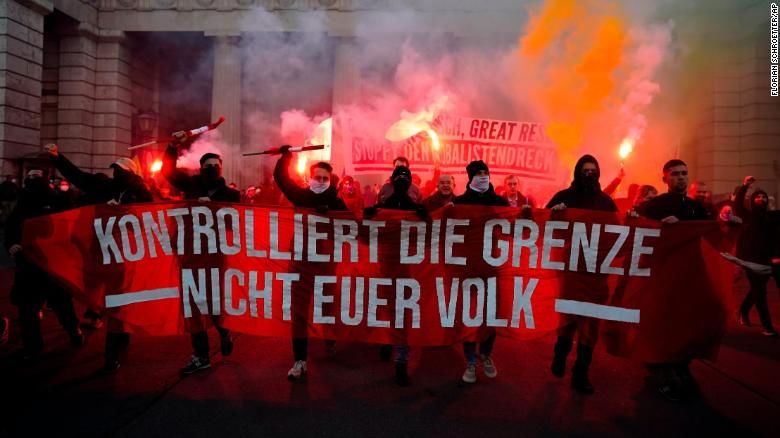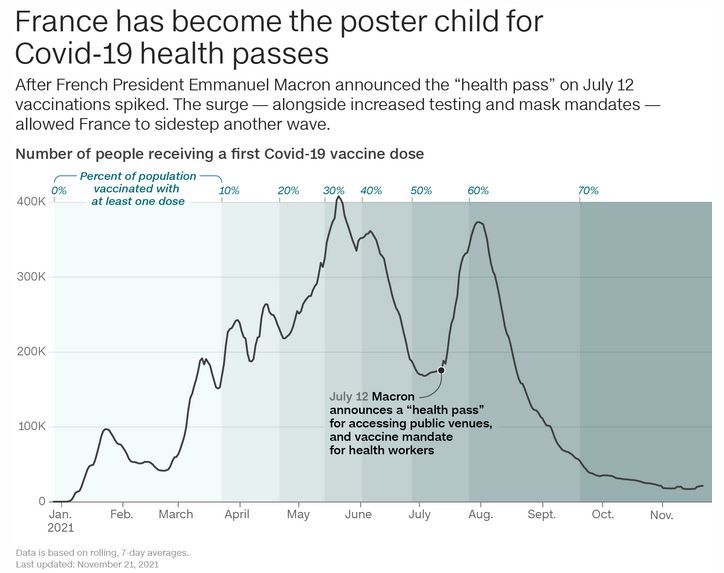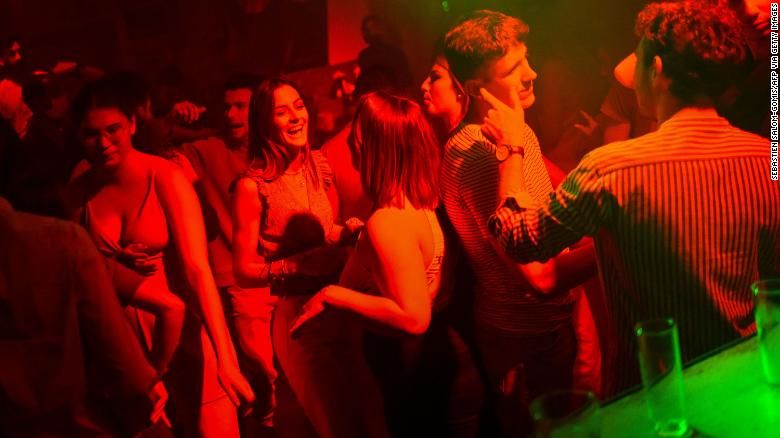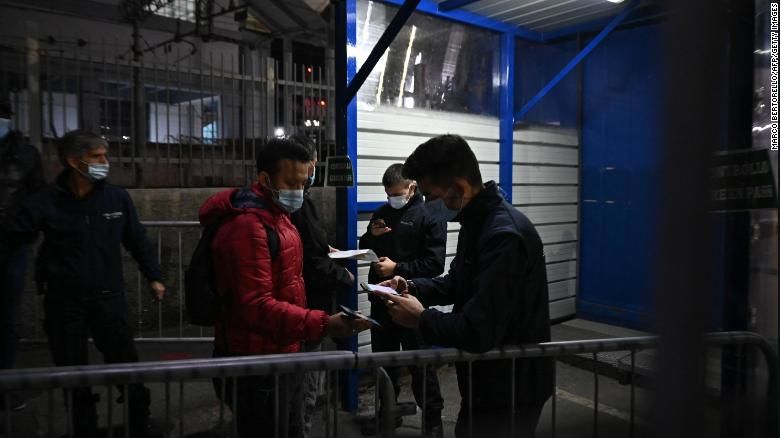
Making Covid-19 vaccines mandatory was once unthinkable. But European countries are showing it can work
Up until then, governments around the world had rejected the idea of a universal coronavirus vaccine mandate, opting instead for incentives and other "nudges" to motivate people to get shots. Even in authoritarian states, like China, it is not mandatory policy.
Austria's extraordinary move came just days after it introduced a lockdown for the unvaccinated — a restriction that went farther than other European nations in singling out the people who have been driving a worrying surge in hospitalizations.
The series of decisions leading Austria to this point reflects the desperate position governments find themselves in as they look to protect public health systems and tentative economic recoveries as cases soar across Europe. The continent is once again ground zero for the global pandemic, despite the widespread availability of vaccines.
It is that irony that has drawn the ire of Europe's leaders, who are growing increasingly frustrated by vaccine skeptics and other pockets of the population still resisting Covid-19 vaccination programs.
Austria's tough new measures were unveiled before the announcement of the discovery of the Omicron variant late last week, which triggered fears that the winter Covid-19 wave could be more brutal than previously thought. The news of the variant could push more countries to harden their approach, pivoting from voluntary to mandatory measures in a last-ditch effort to get shots in arms.
"We have enough vaccines. Science gave us the possibility, the exit ticket out of this vicious circle of virus waves and lockdown discussions. And simply not enough people are using this possibility and taking this exit ticket, and that's why we're still stuck in this situation," Austrian Chancellor Alexander
Schallenberg told CNN last week, explaining his decision to mandate Covid-19 vaccines by February 1. Those failing to adhere to the rule will face an administrative fine, but it's not clear yet how high, or how the policy will be enforced. Nearly one in three people in Austria remain unvaccinated.
"It is a drastic measure. I would have preferred to go another way. But if one year in having the vaccine, of having national campaigns, of having media explaining again and again what this is about, that we have such a high degree of insecurity, of people believing in fake news ... we have a necessity to take this drastic step," Schallenberg added.
 A Christmas market next to Vienna's Stephen's Cathedral, normaly packed with crowds of people, was shuttered last Monday.
A Christmas market next to Vienna's Stephen's Cathedral, normaly packed with crowds of people, was shuttered last Monday.
Countries elsewhere are starting to consider similarly drastic measures to persuade more people to get shots, despite criticisms that low vaccination rates made them unrealistic and would deprive millions from earning a livelihood.
On Sunday, days after his country's scientists first reported the existence of the Omicron variant, South African President Cyril Ramaphosa announced that authorities were looking into whether to mandate Covid-19 vaccinations — and booster shots — for workers and for entry to some public spaces. Kenya was one of the first African nations to introduce restrictions on the unvaccinated last week.
Scientists are still reviewing data to assess how effective existing vaccines are against the new variant, but Moderna's chief has warned in an interview with The Financial Times that he thinks it will amount to "a material drop."
Dr. Anthony Fauci, US President Joe Biden's chief medical adviser, has said that he believes existing vaccines should still provide a degree of protection against severe cases. "Vaccination is going to be the solution to this, whether it's the Delta variant or the Omicron variant," Fauci told CNN's Jake Tapper.
The question over whether or not to pull the trigger on mandates, and how to weigh up the risk to civil liberties against a serious threat to overstretched healthcare systems, has caused a lot of hand-wringing across the world — especially in Europe, a proud bastion for liberal democracy.
But just as lockdowns have become a part of pandemic life, the rapidly emerging view in Europe is that vaccine mandates are not just plausible — they could pay off. Rules in France, Italy and now Austria provide a window into what to expect.
Austria has experienced a surge in vaccinations since the beginning of the November, when the government began to signal more stringent measures for workers. In four weeks, vaccination coverage clicked up about 4 percentage points — more than other Western European Union member over the same time, according to the Our World in Data project at Oxford University.
After the initial lockdown of the unvaccinated on November 14, half a million more people received their first dose, according to the chancellor. That upwards trajectory has continued, though the vast majority of vaccinations are booster shots, Peter Klimek, an associate professor at the Medical University of Vienna and adviser to Austria's health ministry, said.
"From a modelling perspective, it's clear that if you increase the vaccine uptake, it won't be enough by itself to stop the virus from circulating, but it's a huge step to stop the collapse of the healthcare system," Klimek said. "Will a mandate help? Yes, if we find ways to make it work."
As Austria's vaccine mandate has sent tens of thousands of people onto the streets in protests, many more have gone to vaccination centers. "I gave into the government's blackmail. I wanted to wait, but the government had other plans for me," Jaruslav, who would only give his first name, told CNN as he was getting his first shot at Austria's largest vaccine center in Vienna.
 Crowds shout slogans and light flares during a demonstration against
Austria's Covid restrictions. The banner reads: "Control the border. Not
your people."
Crowds shout slogans and light flares during a demonstration against
Austria's Covid restrictions. The banner reads: "Control the border. Not
your people."
While some minds won't change, others — like Jaruslav — will, albeit begrudgingly. For the price of some protests, some European politicians are beginning to come to the conclusion that pushback is worth it in order to compel a slice of the population that would have otherwise been hard to win over.
In explaining Austria's decision, Schallenberg pointed to the successes of Italy, its southern neighbor, and France, which have introduced vaccine mandates in all but name — requiring health passes as proof of vaccination, a negative test or recent recovery from infection to attend public gatherings, travel or go to work — in conjunction with public health measures, like mask wearing. Both countries have also made vaccination mandatory for health workers — two of five countries to do so in Europe, according to the European Centre for Disease Prevention and Control.
France was the first to set the trend towards mandates in Europe, after its vaccination rollout stalled. "France is definitely the poster child for this working," said Thomas Hale, who's been collating countries' policy responses as part of the COVID-19 Government Response Tracker, run by the Blavatnik School of Government at Oxford.
Hale and his colleagues are in the process of adding data on Covid vaccine mandates to their tracker with the aim of answering the big question: Do they work? Of more than 180 countries that the Blavatnik School of Government tracks, Hale said a few stood out for having effective mandates: France, Israel, China and Brazil.
Early this year, Israel became a model for beating back Covid with its use of a vaccine passport, the so-called "Green Pass," but experienced a devastating surge in infections fueled by the fast-spreading Delta variant over the summer after it retired the pass system and dropped other restrictions.
In China, where the pandemic began, the government has achieved a high level of vaccination through an array of contentious carrot and stick incentives, requiring vaccines for students and workers, while enforcing sanctions for those who don't get a shot, through social credit rankings.
Since a number of Brazilian cities, including Rio, began introducing divisive vaccine passports this fall, Brazil, once devastated by the virus, has now surpassed the UK as among the most highly vaccinated countries in the world.
"There's an optimist story to be told that, for the vast majority of people, this is not actually that controversial. There's a lot of focus on the resisters, and rightly so. But it's quite a lot of movement in the right direction," Hale said.

Nowhere has that been more apparent than in France, where President Emmanuel Macron announced the health pass, or "pass sanitaire," on July 12, triggering a dramatic spike in vaccination appointments. Doctolib, the main platform for booking jabs in the country, saw 1 million appointments made in 24 hours.
Thanks in part to its swelling vaccination rate -- along with a massive increase in testing linked to the Covid pass, and the reintroduction of mask mandates in regions badly hit by the Delta variant -- mainland France managed to largely sidestep the fourth wave that swept through Europe over the summer. About 70% in France are now fully vaccinated.
Vittoria Colliza, a Paris-based epidemiologist at Inserm, the French public-health research center, told CNN that the introduction of the pass "was the key to getting out of a stalling situation, where we had reached a saturation point," and proved it was possible to incentivize people previously reluctant to get the vaccine. But now, as European countries with high vaccination rates struggle to contain yet another surge in cases, Colliza said it was clear that additional incentives would be needed to escape the worst as immunity wanes.
A June study out of Israel revealed that while vaccines still offer strong protection against severe Covid-19, their effectiveness in fighting the virus wanes over time, accelerating the need for third booster shots. It has since reinstated its Green Pass, and is mandating a third dose for its renewal.
Macron said recently that a booster dose would be necessary for those aged over 65 to revalidate their health pass from mid-December, in an effort to ensure uptake and avoid the fifth wave.

Italy followed the path of France in July, with Prime Minister Mario Draghi announcing a similar health pass, requiring it as proof of immunity to access an array of venues and services. Though Italy didn't see the same initial surge in vaccinations as France, the policy has helped to slowly turn the dial. And, last month, Italy went beyond France to introduce what was until recently the toughest measure in Europe: A "Green Pass" requiring all of the nation's workers, both public and private, to be vaccinated, prove they had recovered or test negative for Covid in order to get their paycheck.
Since the measure was announce in mid-September, Italy's vaccination coverage has crept up about 5 percentage points. Though not a huge increase, experts argue that at this stage in pandemic, every percentage point helps.
Dr. Roberto Burioni, a leading Italian virologist at San Raffaele University in Milan, said the strict measures of the expanded health pass has not only allowed the country to fully vaccinate around 73% of the population, but also avoid painful restrictions, like the lockdown now enforced in Austria. Burioni also said the pass, which is necessary to access nightlife, had motivated young people in Italy to get jabs.
"What in my opinion was the most remarkable effect is that we experienced a very, very high vaccination rate on the age group from 20 to 30," Burioni said, which he put at about 84%. "These youngsters are very important in the diffusion of the virus. Because, you know, they have a very intense social life. They're one of the reasons Italy is in a better position than other countries."
But he said that even with the tough mandates, and his efforts to fight anti-vaccine disinformation as part of Italy's Covid strategy, there remains a small, loud minority of the population who are dead-set against vaccinations, and seemingly nothing will change their mind. That group, while small, still poses a big problem for Italy in reaching its ultimate goal of vaccinating 90% of the eligible population, Burioni added.
"I can't believe somebody is refusing this after 150,000 deaths in Italy -- everybody here has a relative, a friend who died of Covid. I encounter people in the intensive care unit with Covid who still say that they wouldn't get the shot. They don't regret it, they say 'Oh no, please don't vaccinate me.'"
 A man has his Green Pass checked on October 15 at the entrance of the Fincantieri shipyard in the port of Genoa.
A man has his Green Pass checked on October 15 at the entrance of the Fincantieri shipyard in the port of Genoa.
While the politicization of Covid vaccines, particularly by populist groups in Europe, has made many governments reluctant to enforce mandates on their populations, the risk of harsh lockdowns canceling another chance at a Christmas recovery season has led many to reassess.
As cases in Germany soar, the country's health minister has warned that by winter's end, "just about everyone in Germany will probably be either vaccinated, recovered or dead." Since Wednesday, a new law has required all workers to provide proof of vaccination, recovery or a negative test — those who don't comply will be barred from entering their office and could go unpaid. And Olaf Scholz, Germany's incoming chancellor, said that mandatory vaccinations would be considered by the new coalition because "vaccination is the way out of this pandemic."
In Greece, where infections are rising, Prime Minister Kyriakos Mitsotakis said Tuesday that Covid-19 vaccinations would be made mandatory for all citizens over the age of 60. The Greek government had recently banned unvaccinated adult citizens from entering cinemas, theaters, museums or gyms — with or without a test. Access to public services, banks and shops without a negative test was already restricted for the unvaccinated. The Czech Republic, which is seeing its highest case counts of the pandemic, is also tightening requirements along similar lines.
The ratcheting of restrictions on the unvaccinated is part of a wider movement toward vaccine mandates globally, Thomas Hale says. "Austria's a very dramatic example. But it's very much part of a bigger trend."
There are counterexamples where mandates' effectiveness have been less clear. In the United States, vaccine rules for federal workers, members of the military and people working in healthcare settings, have gone some way to increase uptake among those groups, but it is hard to say whether they've made a significant impact on the general population, Hale says. The Biden administration has also tried to require private companies employing more than 100 people to be fully vaccinated or undergo regular testing, but the measure is being tied up in the courts.
But as countries aim to use lockdowns more judiciously, or avoid them entirely, Hale believes we'll continue to see more leaders moving toward mandates.
British Prime Minister Boris Johnson said in mid-November that the definition of "fully vaccinated" would have to shift at some point to account for booster shots. And, on Monday, the United Kingdom announced it would offer booster vaccines to all adults — and cut the gap between second and third doses from six months to three — in an effort to slow the spread of Omicron.
"I think they [mandates] do work. I think they especially motivate people who are not vaccine adverse, but who are kind of vaccine lazy, a little bit hesitant. And in some countries, that's a big chunk of the population," Hale said, pointing again to France.
"But if you're facing people who are really against vaccination, then it's not as clear to me that those measures will remove that barrier."










